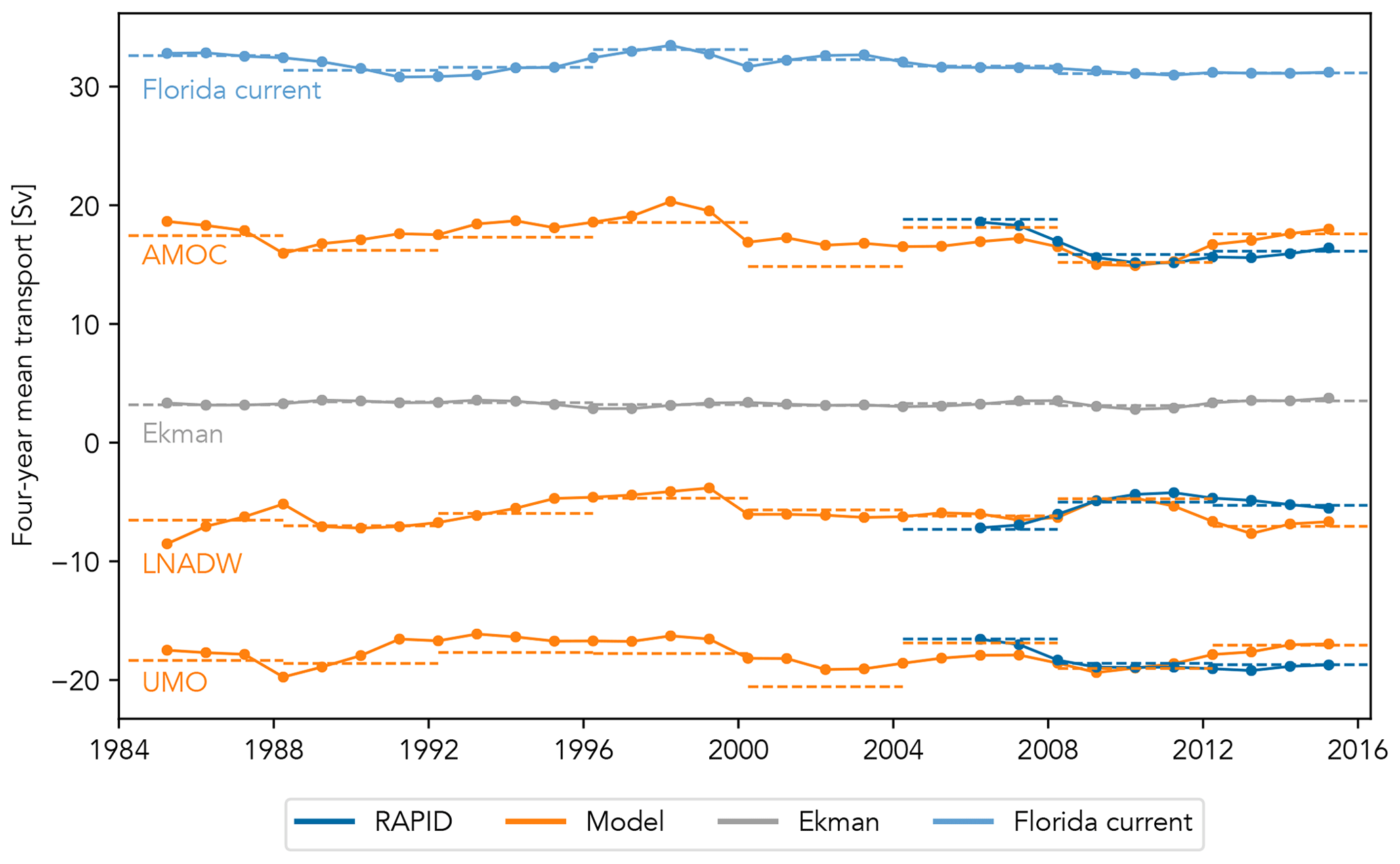A recent study appearing in Nature, “Current Atlantic Meridional Overturning Circulation weakest in last millennium“, authored by Caesar et al, hints at a global climate system on the verge of tipping out of control.
According to their findings, the weakening of the so-called Atlantic Meridional Overturning Current (AMOC) in the 20th century is “unprecedented”, and likely because of man-made climate change.
The paper claims that there was “a long and relatively stable period” that was then followed by “an initial weakening starting in the nineteenth century, followed by a second, more rapid, decline in the mid-twentieth century.” The AMOC has since reached “the weakest” level in recent decades.
Rahmstorf’s doomsday scenario
Also not surprising: one of the authors of the doomsday-like paper is climate über-alarmist researcher Stefan Rahmstorf of the Potsdam Climate Institute in Germany.
According to Rahmstorf, the Gulf Stream “passing its tipping point” would lead to significant northern Atlantic sea level rise, a regional cooling and “massive effects on the entire ecosystem in the North Atlantic”.
No consensus – contradicted even before release
But the paper’s claims were contradicted already six days before its release. So much for consensus.
A new paper by Worthington et al, “A 30-year reconstruction of the Atlantic meridional overturning circulation shows no decline“, tells us there’s been no decline, let alone a “weakest state”.

Image Source: Worthington et al., 2021
The study, appearing in the journal Ocean Science, finds that although a decline in Atlantic meridional overturning circulation (AMOC) strength was observed between 2004 and 2012 and persisted until 2017, “direct observations are sparse prior to 2004, giving only ‘snapshots’ of the overturning circulation.”
Previous models ignored deep circulation changes
The Worthington study also finds that previous studies used linear models based on upper-layer temperature anomalies but that they ignored “changes in the deep circulation that are beginning to emerge in the observations of AMOC decline”.
The authors led by Worthington say they used a higher-fidelity empirical model of the AMOC variability based on many more factors and created an AMOC time series extending from 1981 to 2016.
“No decline”
They found that their more comprehensive time series shows no overall AMOC decline. “Our model has not revealed an AMOC decline indicative of anthropogenic climate change (Stocker et al., 2013) nor the long-term decline reported in sea-surface-temperature-based reconstructions of the AMOC (Caesar et al., 2018).”
Nor that of Caesar et al 2021, for that matter.
Guess which results the media jumped on.





It is hard to see the Atlantic circulations “tipping”, or whatever, unless Earth stops rotating, the Sun stops shining, rivers stop flowing, continents move, the Westerly winds change direction, and cockroaches die off.
Okay, I fetched that last from you know where. Still, should that happen there is no telling what else would be happening.
Ms Caesar is now employed in Ireland. Maynooth University has positioned itself at the centre of Climate and it’s geography department is loaded with socialists. The national broadcaster RTE grabbed some sound bites from her.
https://twitter.com/rtenews/status/1365020069026226177
Here is the transcript
The national tax payer funded broadcaster in Ireland, RTE, does promote catastrophic anthropogenic global warming hypothesis as fact, it has openly stated so and has a target for how much airtime it gives to this topic. The use of the term global heating is taken from the English newspaper The Guardian which is infamous for its alarmist sensationalising of anything climate related.
“researcher who got her PHD from Potsdam Institute for Climate Impact Research (PIK).”
This is quite common. They have trained the next generation of alarmists and sent them out into the world. They have them at Oxford University Environmental Change Institute, they have them in Australia, other places as well. A bit like the Midwych Cuckoos.
“Altogether over 200 young scientists have completed their doctorates at PIK since the institute was founded in 1992.”
The recently finalized NTZ bet, from Jan.05, 2011: “Will The New Decade Be Warmer Than The Last One?“
recalls a bet: “Global Cooling-Wanna Bet?“ by the L. Caesar’s co-author Stefan Rahmstorf (together with Stefan Rahmstorf, Michael Mann, Ray Bradley, William Connolley, David Archer, and Caspar Ammann, in 2008 at: http://www.realclimate.org/index.php/archives/2008/05/global-cooling-wanna-bet/langswitch_lang/en/ )
by opposing an assessment in the journal Nature (Keenlyside et al. 2008), that “over the next decade, the current Atlantic meridional overturning circulation will weaken to its long-term mean; moreover, North Atlantic SST and European and North American surface temperatures will cool slightly…. “. See https://www.nature.com/articles/nature06921
The MSM only report Rahmstorf’s paper, scientists say etc. Rahmstorf reached a tipping point a long time ago.
I’m with Rahmsdorf on this one, his study is based on proxy observations while the “business as usual” AMOC study is all models. Declining AMOC means downturn of AMO and incipient cooling.